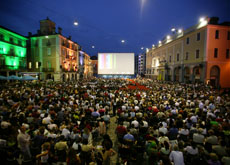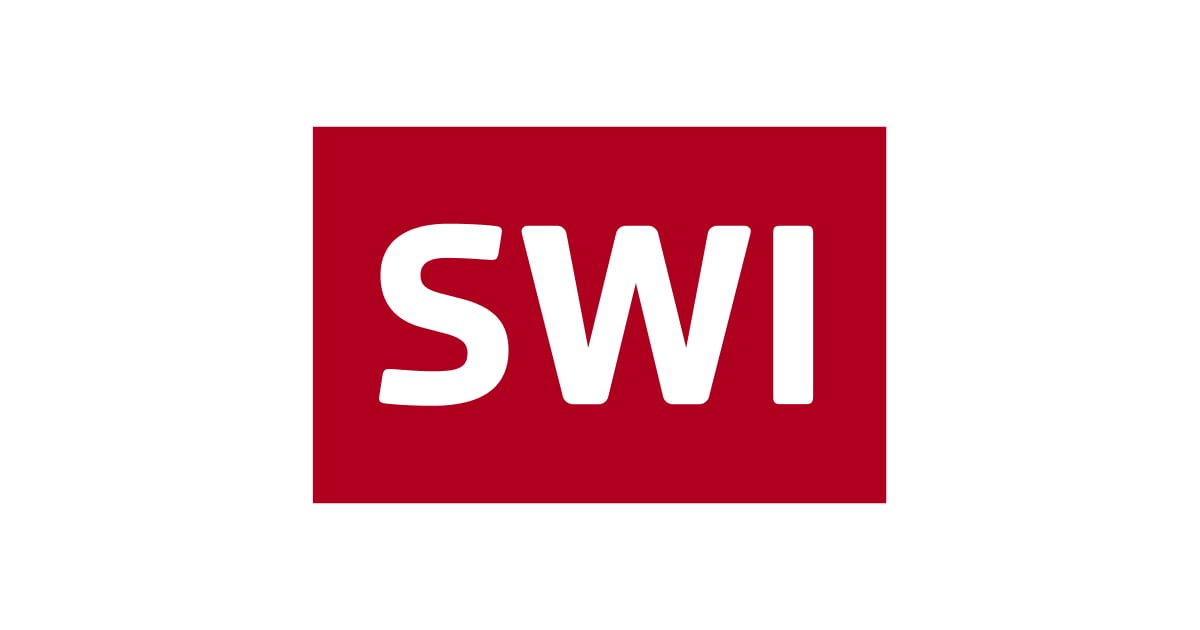Leopard of Locarno changes its spots

The Locarno International Film Festival is for the first time devoting a day to Swiss cinema with a perspective that is both festive and reflective.
Although Swiss film has always been to the fore in all sections of the festival, Swiss Cinema Day aims to project a positive notion of homegrown works.
“This white leopard on a red background symbolises Swiss cinema,” said Nicolas Bideau, head of film at the Federal Culture Office, about the decision to change the festival logo temporarily from yellow and black to the national colours.
“[The animal] is aggressive and thin, but it can run fast and jump far if it wants to.”
Several Swiss films will be screened on Tuesday, including Vitus, Fredi M. Murer’s commercial and critical success about a five-year-old prodigy whose demanding and ambitious parents want him to become a pianist – but he has other ideas.
Vitus has so far been exported to ten countries and Murer picked up the Bronze Bear at this year’s Berlin Film Festival for the film.
The Piazza Grande will then host the world première of Jean-Stéphane Bron’s Mon frère se marie (My brother’s getting married).
Produced by the Lausanne-based company Box Productions, the film is a wry comedy looking at the troubles of a family and their soon-to-be-married adoptive son.
Master classes
Festival goers have also been invited to go “behind the scenes” to learn the art of casting, auditioning and acting from professionals such as Marthe Keller, winner of the Swiss Film Prize for Best Supporting Actress in the film Fragile.
Keller and director Laurent Nègre will attend a screening of the film.
In addition, a free DVD, “Swiss Cinema of Tomorrow”, has been handed out. This showcases extracts of the work of 30 Swiss directors.
“The idea is to present people who embody the future of Swiss cinema,” said Bideau. “Some people might be surprised at the absence of some big names, such as Alain Tanner [winner of the Golden Leopard in 1969 for Charles Mort ou Vif (Charles Dead or Alive)].”
Awards
Also on Tuesday, the Swiss Society of Authors and Suisa, the foundation for the administration of performance rights, handed out SFr85,000 ($70,000) among four scriptwriters for feature-length works of fiction, and two composers.
François Bovy, from canton Vaud, and Silvia Pasternac, from Mexico, shared SFr25,000 for the script for Soif (Thirst).
Naïma Bachiri, from Geneva, received the same for Né un 1er août (Born on the First of August), as did the German Mirco Vogelsang for Das Vermächtnis der Lazariter (The Lazarite Legacy).
The Swiss film music award, worth SFr10,000, was given to Zurich composers Balz Bachmann and Peter Bräker for their soundtrack to the comedy Jeune Homme (The male au pair).
swissinfo with agencies
The Locarno International Film Festival was founded in 1946. It is held in August and is attended by around 90,000 visitors and up to 4,000 professionals. The main award is the Golden Leopard.
The system of public funding for the Swiss cinema, covering all stages of the production and promotion of a film, depends on credits allocated by parliament. This was set at about SFr23 million ($18 million) for 2004-2007.
The remainder – SFr12-15 million – comes directly from the Federal Culture Office’s cinema section.
The 59th Locarno Film Festival takes place from August 2-12.
21 films will be in competition – one of which is Swiss, while 18 are being shown in the Piazza Grande.
The 2006 budget has dropped by 1.5 per cent to SFr9.8 million ($7.9 million).
Swiss Cinema Day had a budget of SFr200,000, financed by the Federal Culture Office, the Locarno Film Festival and other private and public institutions.
In 2005, Swiss films accounted for 6.58% of the 14.95 million admissions into Swiss cinemas. The figure for the US was 58.24%.

In compliance with the JTI standards
More: SWI swissinfo.ch certified by the Journalism Trust Initiative











You can find an overview of ongoing debates with our journalists here . Please join us!
If you want to start a conversation about a topic raised in this article or want to report factual errors, email us at english@swissinfo.ch.